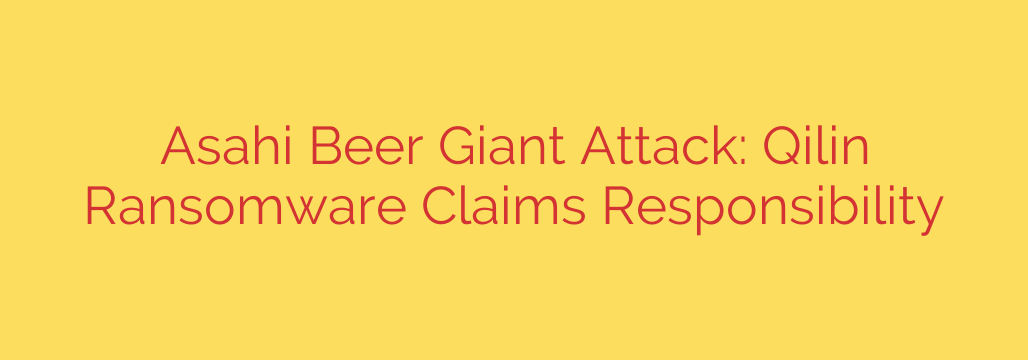
Qilin Ransomware Strikes Global Beer Giant Asahi in Major Cyberattack
In a significant cybersecurity event with far-reaching implications, global beverage leader Asahi Breweries has been targeted by a sophisticated ransomware attack. The notorious Qilin ransomware group has publicly claimed responsibility, adding another high-profile corporation to its list of victims and sending a clear warning to businesses across all sectors.
This incident highlights the persistent and evolving threat that ransomware poses to even the largest and most well-established international companies. While the full extent of the damage is still under investigation, the attack underscores the vulnerability of critical manufacturing and supply chain operations to cyber threats.
Understanding the Attacker: The Qilin Ransomware Group
The Qilin group is a well-known and dangerous threat actor in the ransomware-as-a-service (RaaS) landscape. They are recognized for their targeted attacks against large enterprises, often seeking to inflict maximum operational disruption to leverage higher ransom payments.
A key tactic used by groups like Qilin is “double extortion.” This insidious strategy involves two stages:
- Data Exfiltration: Before encrypting the victim’s network, the attackers steal a significant volume of sensitive corporate data. This can include financial records, employee information, intellectual property, and customer details.
- Data Encryption: The attackers then deploy the ransomware, encrypting critical files and rendering systems unusable.
This two-pronged approach gives the attackers immense leverage. Even if the victim has reliable backups and can restore their systems, the threat of publicly leaking the stolen confidential data creates enormous pressure to pay the ransom. Qilin has already threatened to release data allegedly stolen from Asahi, escalating the severity of the breach.
Why Every Business Should Be on High Alert
The cyberattack on Asahi is not an isolated event; it is part of a troubling trend targeting the food, beverage, and manufacturing industries. These sectors are often seen as lucrative targets due to their reliance on just-in-time supply chains and complex operational technology (OT) systems. Any disruption can lead to immediate and substantial financial losses, making them more likely to consider paying a ransom to restore operations quickly.
This breach serves as a stark reminder that no industry is immune. The primary goal of these cybercriminal groups is financial gain, and they will target any organization they perceive as having the capacity to pay.
Actionable Steps to Defend Against Ransomware Threats
Proactive defense is the only effective strategy against ransomware. Organizations must move beyond basic security measures and adopt a multi-layered, defense-in-depth approach. Here are critical steps every business should implement immediately:
- Strengthen Access Controls: Implement Multi-Factor Authentication (MFA) across all critical systems, especially for remote access, VPNs, and privileged accounts. This is one of the most effective single measures to prevent unauthorized access.
- Conduct Regular Security Training: Phishing emails remain a primary entry point for ransomware. Train your employees to recognize and report suspicious emails and links. A well-informed workforce is your first line of defense.
- Implement a Robust Backup Strategy: Regularly back up all critical data using the 3-2-1 rule (three copies, on two different media types, with one copy off-site). Critically, ensure some backups are immutable or air-gapped, meaning they cannot be altered or deleted by an attacker who has compromised the network.
- Patch and Update Promptly: Attackers frequently exploit known vulnerabilities in software and operating systems. Maintain a rigorous patch management program to ensure all systems are updated as soon as security patches become available.
- Develop an Incident Response Plan: Do not wait for an attack to happen to decide what to do. A well-documented and tested incident response plan ensures your team can act quickly and effectively to contain the threat, minimize damage, and restore operations in a structured manner.
The attack on Asahi Breweries is a clear signal that the threat of ransomware is not diminishing. By learning from this incident and taking decisive action to bolster their own defenses, businesses can significantly reduce their risk of becoming the next headline.
Source: https://securityaffairs.com/183131/cyber-crime/qilin-ransomware-claimed-responsibility-for-the-asahi-attack.html








